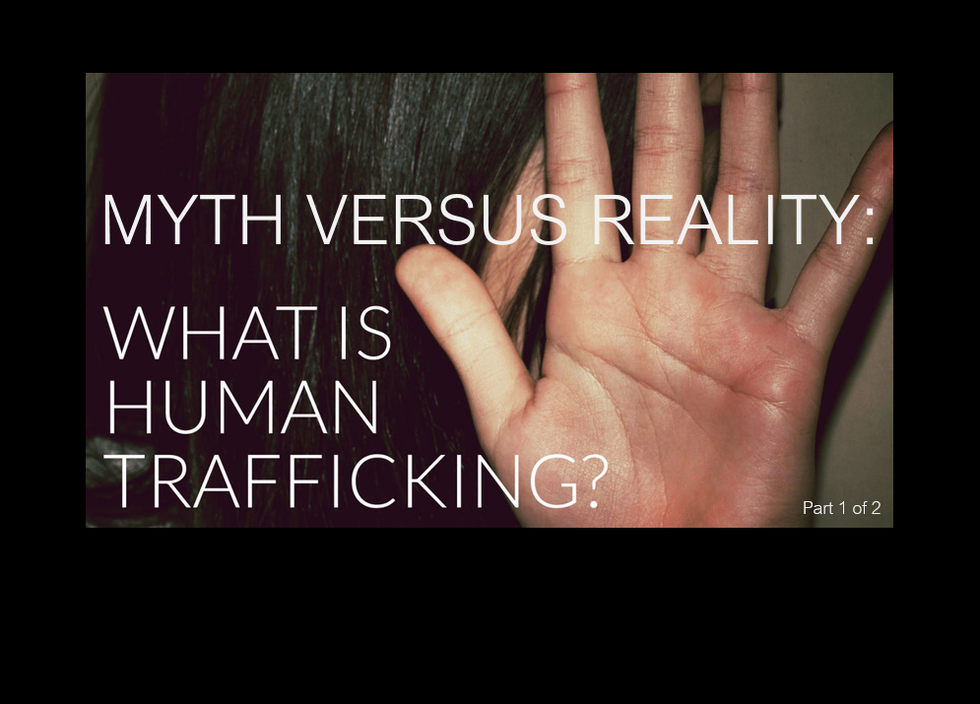Human trafficking is an inherently secretive modern malpractice and therefore is highly misunderstood. Some commonly-held misconceptions regarding this human rights violation makes its eradication and mass support for doing so all the more difficult and strained an endeavor. It is thus imperative that we alter our understanding of trafficking, dismissing previously-accepted falsehoods in exchange for the actual nature of trafficking as experienced by victims themselves.
This article is the first of two through which I plan to invalidate common myths on trafficking. This article, however, concerns itself with misconceptions on the nature of human trafficking, its defining qualities and what the practice entails.
The first common misconception regarding human trafficking is that it requires transportation across borders. Whist transportation across nations or territories may be utilized as a means for coercion into exploitative service, it is not a necessary element of the trafficking definition, as stated in Article 3 paragraph A of the United Nations (UN) protocol on trafficking in persons. In fact, the United Nations Office on Drugs and Crime (UNODC)'s 2014 Global Report on Trafficking in Persons notes that 34% of trafficking occurrences were domestic within national borders.
This very UN definition of trafficking debunks another misconception, that which states that trafficking requires a form of physical restraint, force or bondage. Psychological abuse and use of force, through the form of threats, deception or fraud, are sufficient enough to identify a human trafficking crime. While prior federal law (code 1584) on the sale into involuntary servitude implied the use of physical control as a defining element of the crime, the Trafficking Victims Protection Act (TVPA) of 2000 addressed alternative forms of coercion so as to better refine the previous understanding of physical restraint being the sole element defining trafficking.
Another essential fact to underscore: the consent of the victim and any payment made are negligible and considered irrelevant before the law once a form of force, fraud and/or coercion is exercised. Even if a trafficking victim initially consented to a particular service or was informed about the nature of the work involved, trafficking is defined by the force, fraud or coercion which follows this consent. Article 3 paragraph B of the UN Protocol clearly explicates that "the consent of a victim of trafficking in persons to the intended exploitation set forth in subparagraph (a) [...] shall be irrelevant where any of the means set forth in subparagraph (a) have been used."
The perception that sex trafficking is the only form of human trafficking is also false. Trafficking in persons, per the UN protocol definition, encompasses multiple forms of exploitation from sexual exploitation and forced labor to bonded labor, servitude, practices of slavery and organ removal.
This brings us to another myth, that which falsely claims human trafficking is synonymous with smuggling. Four factors differentiate trafficking from migrant smuggling: consent, exploitation, transnationality and profit. While migrant smuggling may undertake wretched conditions, it always involves consent, whereas any consent granted by trafficking victims is rendered meaningless due to the force, fraud or coercion employed by the trafficker. Additionally, whilst migrant smuggling ends with the migrants' arrival to their destination, trafficking victims suffer from ongoing exploitation. Furthermore, smuggling is defined by its transnational movement, an action not required for trafficking to occur. The source of profits for a smuggler and a trafficker also differ; the former derives profit from the facilitation of illegal entry or stay of an individual into another country while the latter reaps reward from exploitative service, no matter the form (sexual exploitation, forced labor or organ removal).
I sincerely hope that further clarification regarding the nature of this malpractice helps amplify the mass cries for action to be taken to combat this injustice. Abolitionist William Wilberforce once said, “You may choose to look the other way, but you can never say again that you did not know.” Rectifying the myths by discovering the truth on the defining qualities of modern-day slavery is the first step to be taken before we each must choose what to do about these realities.





















